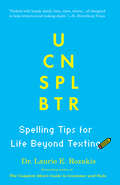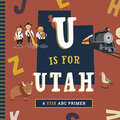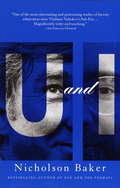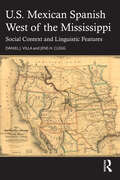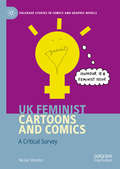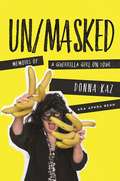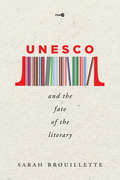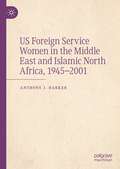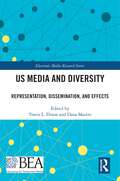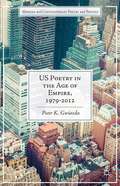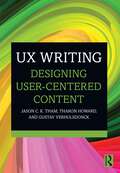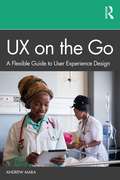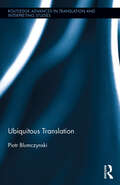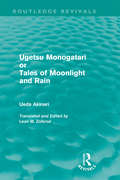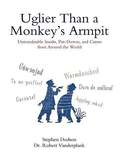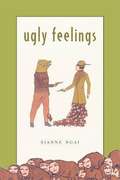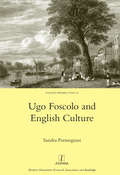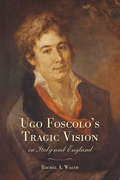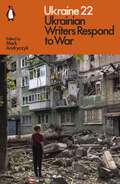- Table View
- List View
U Cn Spl Btr: Spelling Tips For Life Beyond Texting
by Dr. Laurie E. RozakisA quixotic stab at improving the nation's literacy. Hey, it can't hurt. --Asbury Park Sunday PressDid you just end your last memo to your boss "CU L8R?" Do mysterious voices tell you to use "their" and "there" interchangeably? Don't know the difference between "its" and "it's?" Suffer no more--help is on the way! Discover: • The top 50 most misspelled words and how to fix them • 50+ "hard" words that'll immediately power up your spelling IQ • Painless step-by-step exercises • Memory joggers. . . And much more! Using amusing quizzes, humorous tests, and "MadLibs"-type exercises, U Can Spl Btr will help you get into perfect spelling shape. It's never too soon--or too late! Dr. Laurie E. Rozakis earned her Ph.D. in English and American Literature from the State University of New York at Stony Brook. A full professor of English at Farmingdale State College, Dr. Rozakis has published over 100 books, including The Complete Idiot's Guide to Grammar and Style, The Complete Idiot's Guide to Creative Writing, Vocabulary for Dummies, and The Portable Jewish Mother: Guilt, Food, and. . .When Are You Giving Me Grandchildren? Dr. Rozakis frequently appears on television, including Live with Regis and Kelly, The CBS Morning Show, Good Day, New York, Metro Relationships, and Fox Personal F/X. Her career and books have been profiled in The New York Times, the New York Daily News, Time magazine, and the Chicago Tribune.
U Is for Utah
by Christopher RobbinsAn ABC primer of the unique places and animals specific to Utah.
U.S. Mexican Spanish West of the Mississippi: Social Context and Linguistic Features
by Daniel J. Villa Jens H. CleggU.S. Mexican Spanish West of the Mississippi proposes a macro-dialect of the most widely spoken Spanish variety in the western United States from a number of social and linguistic angles. This book is unique in its focus on this one variety of Spanish, which allows for a closer investigation of the social context and linguistic features through a number of different topics. Comprised of 13 chapters divided into two sections, this textbook provides insight into the history, demographics, migration, and social issues of US Mexican Spanish in the first section and its lexicography, phonology, and structure in the second. Useful for scholars interested in Spanish in the United States, dialectology, and sociolinguistics, this is also an ideal resource for advanced undergraduate and graduate students of Spanish.
U.S. Navy Alphabet Book (Jerry Pallotta's Alphabet Books)
by Jerry Pallotta Sammie GarnettLearn about the Navy SEALS, aircraft carriers, submarines, and much more. This unique alphabet book also introduces readers to the semaphore, international code flag, and radio alphabets.
UK Feminist Cartoons and Comics: A Critical Survey (Palgrave Studies in Comics and Graphic Novels)
by Nicola StreetenThis book demonstrates that since the 1970s, British feminist cartoons and comics have played an important part in the Women’s Movement in Britain. A key component of this has been humour. This aspect of feminist history in Britain has not previously been documented. The book questions why and how British feminists have used humour in comics form to present serious political messages. It also interrogates what the implications have been for the development of feminist cartoons and for the popularisation of feminism in Britain. The work responds to recent North American feminist comics scholarship that concentrates on North American autobiographical comics of trauma by women. This book highlights the relevance of humour and provides a comparative British perspective. The time frame is 1970 to 2019, chosen as representative of a significant historical period for the development of feminist cartoon and comics activity and of feminist theory and practice. Research methods include archival data collection, complemented by interviews with selected cartoonists. Visual and textual analysis of specific examples draws on literature from humour theory, comics studies and feminist theory. Examples are also considered as responses to the economic, social and political contexts in which they were produced.
UN/MASKED: Memoirs of a Guerrilla Girl on Tour
by Donna KazUN/MASKED, Memoirs of a Guerrilla Girl On Tour! follows the surprising 25 year journey of a young, New York City actress swept off her feet by a rising movie star who carries her to Malibu and back for a three-plus year love affair that is both fantastical and physically dangerous. When Nicole Brown Simpson and Ron Goldman are murdered in Brentwood she hears a bell go off, awakening her angry, activist spirit. Always an outsider, she takes one step further into invisibility and becomes a Guerrilla Girl, a feminist activist who never appears in public without wearing a rubber gorilla mask and who uses the name of a dead woman artist instead of her own. As a Guerrilla Girl, Aphra Behn creates comedic art and theater that blasts the blatant sexism of the theater world while proving feminists are funny at the same time.These two narratives-that of a young victim of domestic violence at the hands of a successful film actor and that of an artist so fed up with sexism in the theater world that she puts on a gorilla mask and takes the name of a dead woman artist to provoke change-have been lived by one woman. Donna Kaz offers her compelling firsthand account-illuminated by more than thirty behind-the-scenes photographs, stickers and posters -of her transition from a silent observer to an unapologetic activist.This is the memoir of a woman-turned-survivor-turned-radical-feminist who takes off her mask and, by merging her identities, reveals all.
UNESCO and the Fate of the Literary (Post*45)
by Sarah BrouilletteA case study of one of the most important global institutions of cultural policy formation, UNESCO and the Fate of the Literary demonstrates the relationship between such policymaking and transformations in the economy. Focusing on UNESCO's use of books, Sarah Brouillette identifies three phases in the agency's history and explores the literary and cultural programming of each. In the immediate postwar period, healthy economies made possible the funding of an infrastructure in support of a liberal cosmopolitanism and the spread of capitalist democracy. In the decolonizing 1960s and '70s, illiteracy and lack of access to literature were lamented as a "book hunger" in the developing world, and reading was touted as a universal humanizing value to argue for a more balanced communications industry and copyright regime. Most recently, literature has become instrumental in city and nation branding that drive tourism and the heritage industry. Today, the agency largely treats high literature as a commercially self-sustaining product for wealthy aging publics, and fundamental policy reform to address the uneven relations that characterize global intellectual property creation is off the table. UNESCO's literary programming is in this way highly suggestive. A trajectory that might appear to be one of triumphant success—literary tourism and festival programming can be quite lucrative for some people—is also, under a different light, a story of decline.
US Air Force Alphabet Book (Jerry Pallotta's Alphabet Books)
by Jerry Pallotta Sammie GarnettLearn fascinating facts about an important branch of our armed forces, the US Air Force--one for each letter of the alphabet!With facts from both history and the modern era, each letter covers something air force related. From the fighter jets and Red Horse to Tuskegee and insignia, this book is a wealth of information that highlights the courage and commitment it takes to serve in the US Air Force.
US Army Alphabet Book
by Jerry Pallotta Sammie GarnettTake a look at fascinating facts about the US Army--one for each letter of the alphabet! There's a lot to learn about this important branch of our armed forces.With facts from both history and the modern era, each letter covers something Army related. From the cavalry and jeeps to reserves and special forces, this book is a wealth of information that highlights the courage and commitment it takes to serve in the US Army.
US Coast Guard Alphabet Book (Jerry Pallotta's Alphabet Books)
by Jerry Pallotta Sammie GarnettLearn fascinating facts about an important branch of our armed forces, the US Coast Guard--one for each letter of the alphabet!With facts from both history and the modern era, each letter covers something coast guard related. From the fast response boats and icebreakers to Jacob's ladders and yardarms, this book is a wealth of information that highlights the courage and commitment it takes to serve in the US Coast Guard.
US Foreign Service Women in the Middle East and Islamic North Africa, 1945–2001
by Anthony J. BarkerFocusing on the attitudes and experiences of American female diplomats and spouses, this book examines the social, political, and cultural dimensions of American interactions with the Middle East and North Africa in the five decades after the Second World War. A turbulent period, marked by conflicts associated with the Cold War and decolonization, it was also characterized by changing attitudes to women at odds with those in Moslem societies. The impact of those changes is explored throughout this book, principally drawing on personal oral histories included in the 'Frontline Diplomacy' collection, but reinforced by cables passing between regional U.S. embassies and the State Department in Washington DC.
US Marines Alphabet Book
by Jerry Pallotta Sammie GarnettTake a look at fascinating facts about the US Marines--one for each letter of the alphabet! There's a lot to learn about this important branch of our armed forces.With information from both history and the modern era, each letter covers something related to the Marines. From fire teams to jets, and from Parris Island to uniforms, this book is a wealth of information that highlights the courage and commitment it takes to serve in the US Marines.
US Media and Diversity: Representation, Dissemination, and Effects (Electronic Media Research Series)
by Travis L. Dixon Dana MastroThis volume fully illuminates the role of diversity in media representation, dissemination, and effects across various platforms, including social media. Against a backdrop of shifting demographics and increasing diversity, the book highlights the implications for media consumption patterns and explores the simultaneous rise in online hate.Organized into three thematic sections, the book first centers people of color in the discussion of media stereotypes and identity, considering the impact of technology on such identities. This volume then moves to analyze the news media, and how stereotypes are presented and perpetuated, before focusing on paradigm shifts brought on by critical media effects and counter-stereotyping research. The empirical studies and theoretical analyses push readers to imagine better how Communication scholars can advance this essential work at a precarious time in history.Budding and senior scholars interested in understanding stereotypical media representations and effects will gain insights from this critical and timely book, and it will interest those working in the areas of media and communication, media representation, social justice, diversity and inclusion, media sociology, social media, and journalism.
US Poetry in the Age of Empire, 1979–2012
by Piotr K. GwiazdaExamining poetry by Robert Pinsky, Adrienne Rich, and Amiri Baraka, among others, this book shows that leading US poets since 1979 have performed the role of public intellectual through their poetic rhetoric. Gwiazda's argument aims to revitalize the role of poetry and its social value within an era of global politics.
UX Writing: Designing User-Centered Content
by Tharon Howard Jason C.K. Tham Gustav VerhulsdonckThis flexible textbook provides an integrated approach to user experience (UX) writing and equips students and practitioners with the essential principles and methods to succeed in writing for UX. The fundamental goal of UX writing is to produce usable and attractive content that boosts user engagement and business growth. This book teaches writers how to create content that helps users perform desired tasks while serving business needs. It is informed by user-centered design, content strategy, artificial intelligence (AI), and digital marketing communication methodologies, along with UX-related practices. By combining writing-as-design and design-as-writing, the book offers a new perspective for technical communication education where UX design and writing are merged to achieve effective and desirable outcomes. Outlining the key principles and theories for writing user-centered content design, this core textbook is fundamental reading for students and early career practitioners in UX, technical communication, digital marketing, and other areas of professional writing.
UX on the Go: A Flexible Guide to User Experience Design
by Andrew MaraDesigned with flexibility and readers’ needs in mind, this purpose driven book offers new UX practitioners succinct and complete intructions on how to conduct user research and rapidly design interfaces and products in the classroom or the office. With 16 challenges to learn from, this comprehensive guide outlines the process of a User Experience project cycle from assembling a team to researching user needs to creating and veryifying a prototype. Practice developing a prototype in as little as a week or build your skills in two-, four-, eight-, or sixteen-week stretches. Gain insight into individual motivations, connections, and interactions; learn the three guiding principles of the design system; and discover how to shape a user’s experience to achieve goals and improve overall immediate experience, satisfaction, and well-being. Written for professionals looking to learn or expand their skills in user experience design and students studying technical communication, information technology, web and product design, business, or engingeering alike, this accessible book provides a foundational knowledge of this diverse and evolving field. A companion website will include examples of contemporary UX projects, material to illustrate key techniques, and other resources for students and instructors. Access the material at uxonthego.com.
Ubiquitous Translation (Routledge Advances in Translation and Interpreting Studies)
by Piotr BlumczynskiIn this book, Piotr Blumczynski explores the central role of translation as a key epistemological concept as well as a hermeneutic, ethical, linguistic and interpersonal practice. His argument is three-fold: (1) that translation provides a basis for genuine, exciting, serious, innovative and meaningful exchange between various areas of the humanities through both a concept (the WHAT) and a method (the HOW); (2) that, in doing so, it questions and challenges many of the traditional boundaries and offers a transdisciplinary epistemological paradigm, leading to a new understanding of quality, and thus also meaning, truth, and knowledge; and (3) that translational phenomena are studied by a broad range of disciplines in the humanities (including philosophy, theology, linguistics, and anthropology) using various, often seemingly unrelated concepts which nevertheless display a considerable degree of qualitative proximity. The common thread running through all these convictions and binding them together is the insistence that translational phenomena are ubiquitous. Because of its unconventional and innovative approach, this book will be of interest to translation studies scholars looking to situate their research within a broader transdisciplinary model, as well as to students of translation programs and practicing translators who seek a fuller understanding of why and how translation matters.
Ugetsu Monogatari or Tales of Moonlight and Rain: A Complete English Version of the Eighteenth-Century Japanese collection of Tales of the Supernatural (Routledge Revivals)
by Ueda AkinariUgetsu Monogatari, or Tales of Moonlight and Rain numbers among the best-loved Japanese classics. These nine illustrated tales of the supernatural from eighteenth-century Osaka combine popular appeal with a high literary standard. The author expressed his complex views on human life and society in simple yet poetic language. Akinari questioned the prevailing moral values and standards of his age whilst entertaining his readers with mystery and other-worldly occurrences. This is a reissue of Leon Zolbrod’s definitive English translation of the work, first published in 1974.
Uglier Than a Monkey's Armpit: Untranslatable Insults, Put-Downs, and Curses from Around the World
by Stephen Dodson Robert VanderplankThe most curious, funny, insightful, and expressive invectives from more than forty languages-fully illustrated, you miserable misokakku. "Misokkasu": Scum of soya paste. (Japanese) "Tu es um borra-battos.": You s**t in your own boots. <P><P>(Portugese) "Like a fart in a trance.": A dreamy person who seems at a loss what to do. (Scottish) "A pies ci morde lizal!": Literally, a dog has licked your gob. (Polish) "Prumphaensn.": Fartchicken. (Icelandic) Whether borne out of surprise, anger, passion, or humor, curses and insults make up some of the most colorful and profound phrases in a language. <P>In Uglier Than a Monkey's Armpit, word experts Dr. Robert Vanderplank and Stephen Dodson have scoured the world looking for the most interesting, insightful, and expressive invectives from more than forty languages. These are the words you won't learn in any language class. Arranged by language, containing pointers on gestures, and appropriately illustrated, Uglier Than a Monkey's Armpit (a Spanish phrase to avoid) will equip you with the vocabulary to amuse, shock, offend, and let off steam, wherever you happen to be.
Ugly Feelings
by Sianne NgaiNgai mobilizes the aesthetics of unprestigious negative affects such as irritation, envy, and disgust to investigate not only ideological and representational dilemmas in literature--with a particular focus on those inflected by gender and race--but also blind spots in contemporary literary and cultural criticism. Her work maps a major intersection of literary studies, media and cultural studies, feminist studies, and aesthetic theory.
Ugly White People: Writing Whiteness in Contemporary America
by Stephanie LiWhiteness revealed: an analysis of the destructive complacency of white self-consciousness White Americans are confronting their whiteness more than ever before, with political and social shifts ushering in a newfound racial awareness. And with white people increasingly seeing themselves as distinctly racialized (not simply as American or human), white writers are exposing a self-awareness of white racialized behavior—from staunch antiracism to virulent forms of xenophobic nationalism. Ugly White People explores representations of whiteness from twenty-first-century white American authors, revealing white recognition of the ugly forms whiteness can take. Stephanie Li argues that much of the twenty-first century has been defined by this rising consciousness of whiteness because of the imminent shift to a &“majority minority&” population and the growing diversification of America&’s political, social, and cultural institutions. The result is literature that more directly grapples with whiteness as its own construct rather than a wrongly assumed norm. Li contextualizes a series of literary novels as collectively influenced by changes in racial and political attitudes. Turning to works by Dave Eggers, Sarah Smarsh, J. D. Vance, Claire Messud, Ben Lerner, and others, she traces the responses to white consciousness that breed shared manifestations of ugliness. The tension between acknowledging whiteness as an identity built on domination and the failure to remedy inequalities that have proliferated from this founding injustice is often the source of the ugly whiteness portrayed through these narratives. The questions posed in Ugly White People about the nature and future of whiteness are vital to understanding contemporary race relations in America. From the election of Trump and the rise of white nationalism to Karen memes and the war against critical race theory to the pervasive pattern of behavior among largely liberal-leaning whites, Li elucidates truths about whiteness that challenge any hope of national unity and, most devastatingly, the basic humanity of others. Retail e-book files for this title are screen-reader friendly.
Ugo Foscolo and English Culture
by Sandra Parmegiani"The history of the literary relations between Italy and England has its most celebrated early modern representative in Ugo Foscolo (1778-1827). Foscolo's translation of Laurence Sterne's A Sentimental Journey through France and Italy is often regarded as the benchmark of his English experience, but there is more - around and beyond his relationship with Sterne - that can be uncovered. With over 3,000 letters spanning three decades, Foscolo's correspondence represents a unique perspective from which to monitor his literary, philosophical, and political views. The 'Epistolario' is also a space in which Foscolo engages with literary, philosophical, and moral questions, and a place where he exercises an often private form of literary criticism. These are letters which ultimately produce one of the most complete yet most composite self-portraits in the history of modern Italian autobiography. In the first comprehensive and historicized reading of Foscolo's correspondence, Sandra Parmegiani reveals the rich and complex relations between the Italian writer and the literature, philosophy, and culture of eighteenth- and nineteenth-century England."
Ugo Foscolo's Tragic Vision in Italy and England
by Rachel A. WalshOne of the most celebrated Italian writers of the early Romantic period, Ugo Foscolo (1778-1827) was known primarily as a novelist, a poet, and a nationalist. Following the Napoleonic Wars, he lived in self-exile in England during the last decade of his life. There he wrote numerous critical essays and collaborated with Lord Byron and other well-known members of English literary circles.Ugo Foscolo's Tragic Vision in Italy and England examines an underexplored aspect of Foscolo's literary career: his tragic plays and critical essays on that genre. Rachel A. Walsh argues that for Foscolo tragedy was more than another genre in which to exercise his literary ambitions. It was the medium for an elaborate life-long process of self-examination and engagement with political and literary conflict. By analysing Foscolo's tragic struggles on and off the stage, Walsh sheds new light on his career and how it reflects on the important literary and political trends of the time.
Ukraine 22: Ukrainian Writers Respond to War
by Mark Andryczyk'The extraordinary writers in this volume articulate the taste, the terror, and the dialect of war; they command their powers of description to face a shameless empire intent on annihilating them' Ellena SavageA selection of Ukraine's leading writers convey the reality of life within Ukraine during the first year of the invasionOn 24 February 2022, the lives of Ukrainians were devastatingly altered. Since that day, many of Ukraine's writers have attempted to fathom what is happening to them and to their country. This anthology brings together writing from inside Ukraine, by Ukrainians, available in English for the first time. Here they document everyday life, ponder the role of culture amid conflict, denounce Russian imperialism and revisit their relations with the world, especially Europe and its ideals, as they try to comprehend the horrors of war.From tearing-downs of Russia's use of culture as justification of the war to moving descriptions of nights spent sheltering in corridors, poignant snatched moments with a husband on his single night away from the army, to descriptions of the eerie weather in the months leading up to the invasion, as if nature was trying to warn Ukraine, these essays reveal the texture, rawness and reality of life in Ukraine under war as never before.
